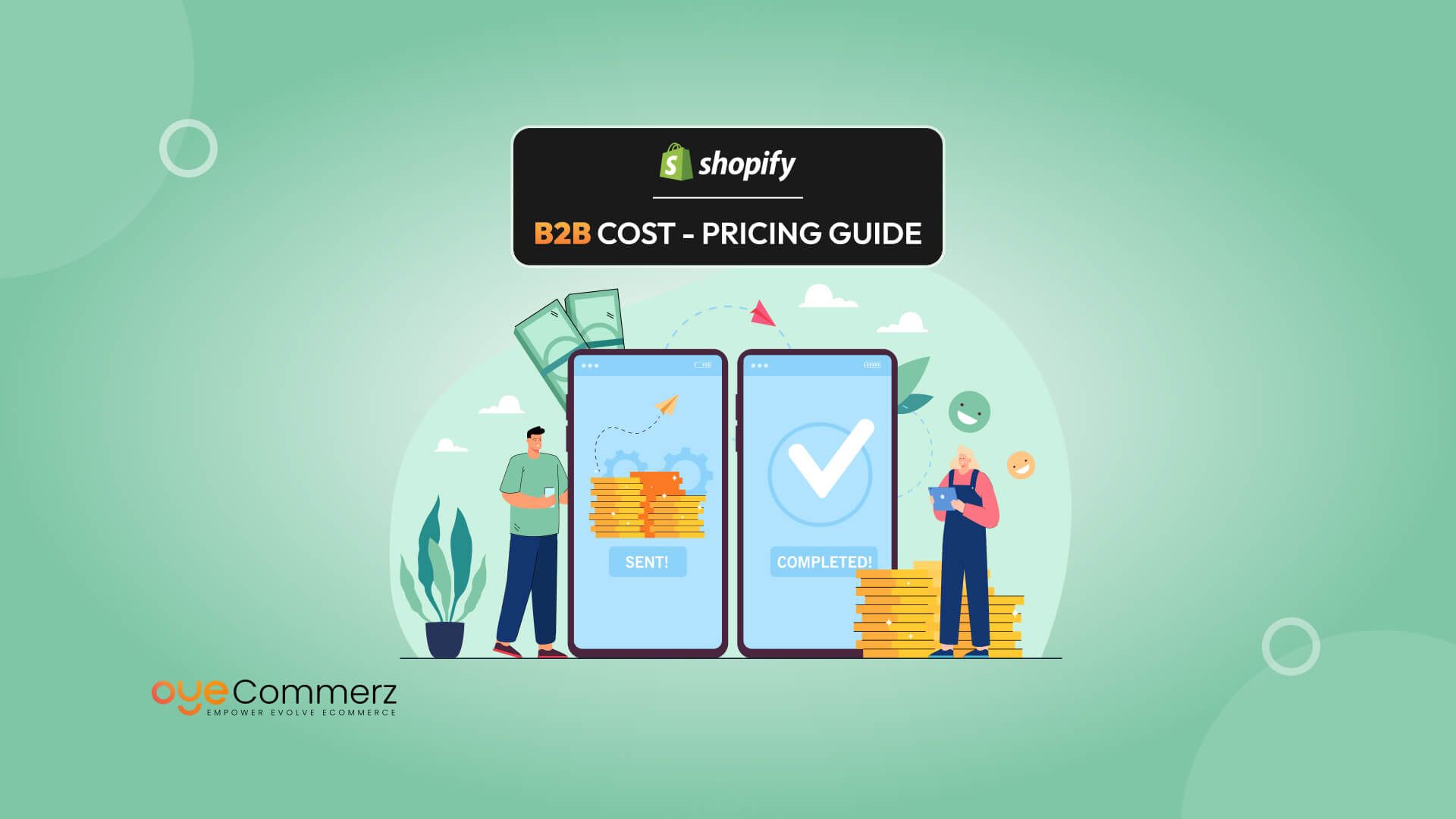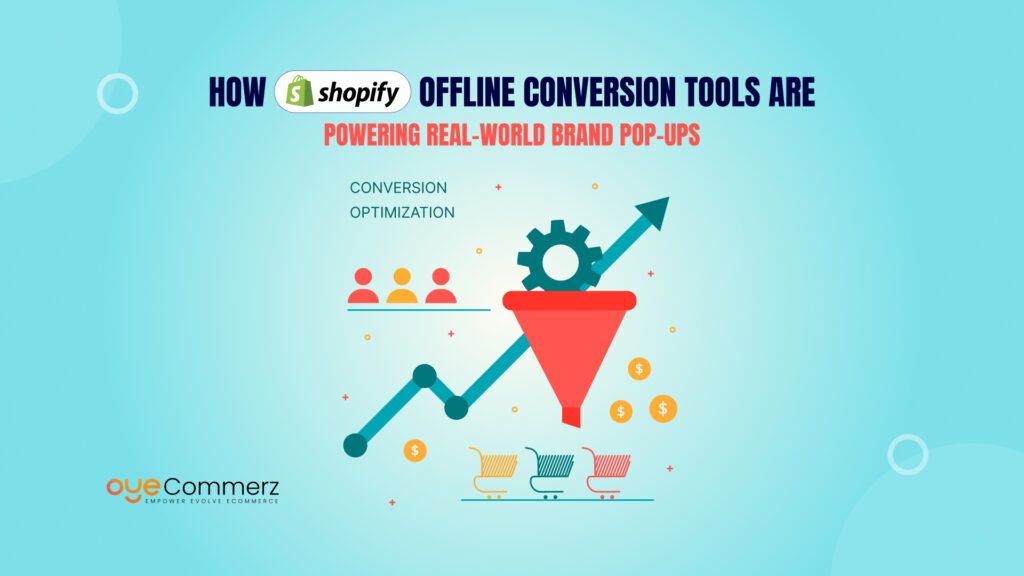You’re a B2B brand ready to scale. Orders are growing, operations are tightening, and now you’re eyeing Shopify to take things to the next level. But there’s one question keeping you from moving forward, how much does Shopify B2B cost? If you’ve tried finding a straight answer online, you’ve probably hit a wall of vague numbers, marketing fluff, or one-size-fits-all pricing breakdowns that don’t match your business reality.
You’re not alone. Many B2B businesses face the same confusion when navigating Shopify’s pricing, especially since B2B needs are different from typical retail setups. From features to functionality, the costs aren’t always obvious.
This guide changes that. We’re going beyond generic pricing pages and giving you a transparent, real, and complete breakdown of what Shopify B2B might actually cost your business.
If you’re tired of vague pricing and just want real numbers and real value, this one’s for you.
Table of Contents
ToggleUnderstanding the Shopify B2B Ecosystem
When people hear “Shopify,” they often think of sleek DTC (direct-to-consumer) brands, fast checkouts, and Instagrammable storefronts. But Shopify has quietly and steadily evolved into something much more powerful, a serious contender for B2B operations.
So what is Shopify B2B, really?
It’s not a standalone product. It’s a set of native features and tools, available within Shopify Plus, that’s purpose-built to help you serve wholesale buyers, distributors, and business clients without relying entirely on third-party workarounds.
In simple terms, Shopify B2B enables you to:
- Set customer-specific pricing and payment terms
- Create company profiles with multiple buyers under one account
- Automate volume-based discounts
- Run B2B and DTC sales from the same backend
- Offer flexible checkout and payment workflows
Whether you’re a manufacturer, wholesaler, or distributor, this ecosystem is designed to support your workflows, your margins, and your buying cycles. It doesn’t try to turn your B2B store into a flashy DTC brand, it helps you keep things professional, efficient, and scalable.
Shopify’s journey here wasn’t overnight. Originally built for small ecommerce entrepreneurs, Shopify listened to the market and expanded its feature set to meet the rising demand for digital B2B selling. Now, with tools to manage inventory, buyers, pricing, and more, Shopify B2B is no longer an afterthought. It’s a core strategic offering.
Shopify B2B isn’t just a feature add-on, it’s a complete framework designed to scale alongside your business. Whether you’re new to online B2B or switching from clunky legacy systems, it’s a solution that adapts as you grow.
Shopify Pricing Plans – A Quick Overview
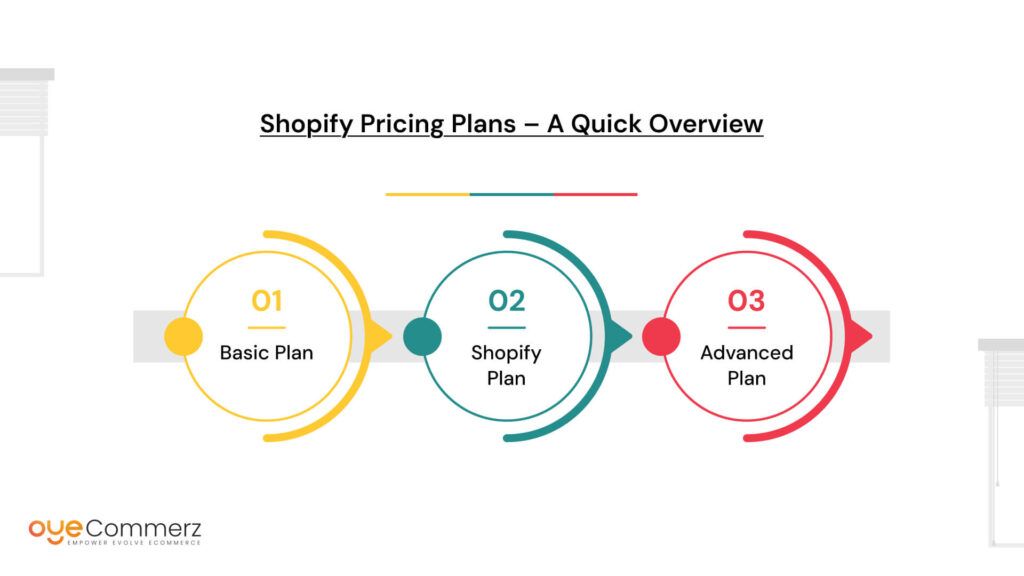
Before diving into the actual Shopify B2B cost, let’s take a quick look at the pricing structure Shopify offers. This part matters, because how you plan your B2B operations depends on the features available at each level.
Shopify has three main pricing tiers, and here’s what each one typically includes:
1. Basic Plan
- Ideal for startups or testing waters
- Limited reporting features
- No advanced automation
- Good enough if you’re just starting with B2B manually (think spreadsheets, basic tagging)
2. Shopify Plan
- Better for growing operations
- More detailed reporting and analytics
- Option to use apps for volume-based discounts, payment terms, etc.
- A solid middle-ground if you’re scaling B2B carefully
3. Advanced Plan
- Designed for high-volume operations
- Deeper insights and reporting
- Greater customization possibilities
- Best for businesses with complex pricing or multiple staff managing B2B orders
Across all plans, you can run both B2C and B2B setups from the same dashboard. But for truly smooth B2B operations, you’ll likely need to layer in third-party apps, especially for features like wholesale pricing, custom catalogs, or invoice-based payments.
Your actual cost depends not just on your Shopify plan, but also the apps, integrations, and features you’ll need to make it truly B2B-ready. We’ll break that all down next.
Core B2B Features Shopify Offers That Matter
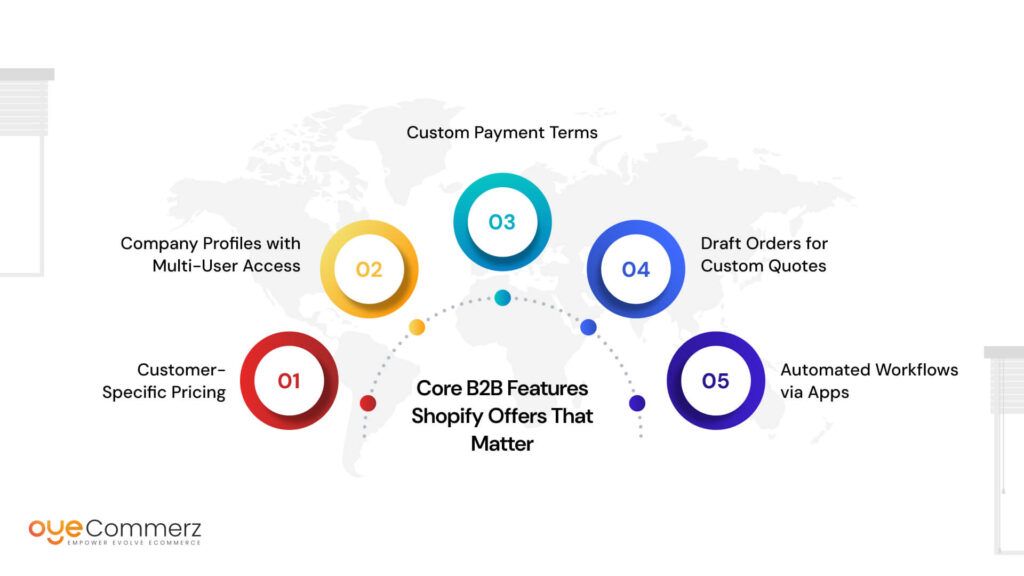
If you’re running a B2B business, you already know it’s a different ballgame compared to B2C. The buying process is more complex, the orders are larger, and your customers have specific needs. Shopify may not scream “B2B” at first glance, but it’s packed with features that can make your wholesale operations run smoother than you’d expect.
Here are the key B2B-focused features that matter most for your setup:
1. Customer-Specific Pricing
You can create pricing rules based on customer tags or groups, allowing you to offer different prices to different buyers, perfect for wholesale accounts, tiered partners, or loyal business clients.
2. Company Profiles with Multi-User Access
B2B buyers often work in teams. Shopify lets you set up company accounts where multiple users can place and track orders under one business profile.
3. Custom Payment Terms
Instead of upfront payments, you can set net payment terms like Net 15, Net 30, etc. This is essential for building trust with business clients and matching traditional B2B buying behavior.
4. Draft Orders for Custom Quotes
Sales reps can create draft orders, apply custom pricing, or offer one-time discounts. This is especially useful in B2B when pricing negotiations happen offline.
5. Automated Workflows via Apps
While some features are native, others like approval flows or bulk ordering, can be easily added using apps from the Shopify ecosystem. These tools fill in the gaps without expensive custom development.
These features aren’t just helpful, they’re critical for serious B2B development. Shopify gives you enough flexibility to run complex sales processes without needing a completely separate platform.
What Does Shopify B2B Cost?
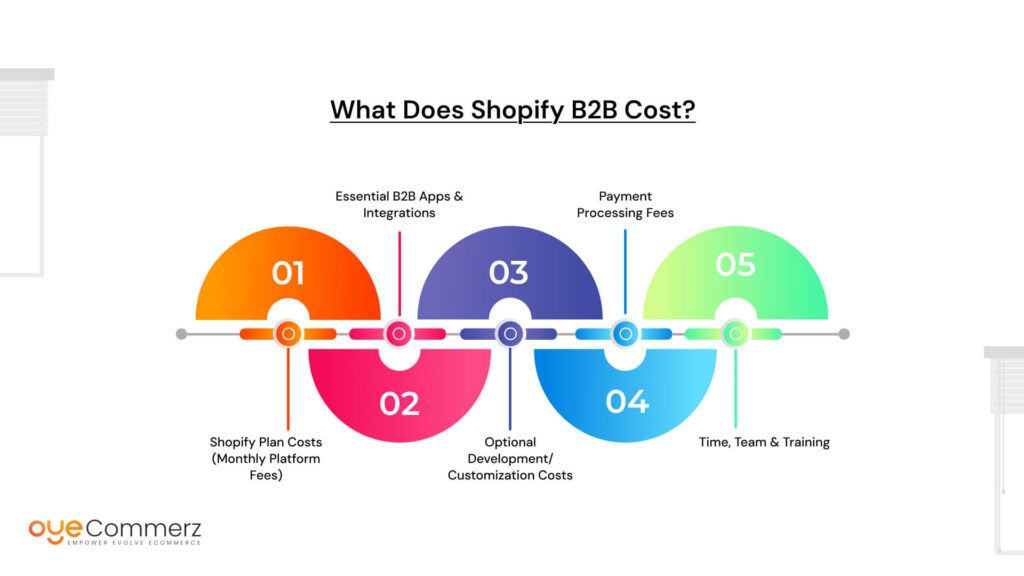
Here’s where things start to get real. If you’re considering Shopify for your B2B business, you’re probably wondering what the actual costs look like, not just the base subscription, but everything that goes into making your store truly work for B2B buyers.
Let’s walk through the real-world costs and what you’re likely to spend depending on how complex your needs are.
1. Shopify Plan Costs (Monthly Platform Fees)
Shopify offers three core pricing plans, and while these are designed primarily for B2C, many B2B sellers start here:
- Basic ($39/month): Best if you’re just getting started or testing B2B waters. Limited reporting and no real automation features.
- Shopify Plan ($105/month): A good middle ground. Offers better reports, more staff accounts, and supports third-party B2B apps well.
- Advanced Plan ($399/month): Built for scaling businesses. Offers advanced reports, lower transaction fees, and more tools for managing larger teams and complex setups.
Most businesses trying to manage Shopify B2B cost effectively land on the Shopify or Advanced plan because they offer the flexibility needed for a functional wholesale operation.
2. Essential B2B Apps & Integrations
Out-of-the-box, Shopify isn’t fully B2B-ready but that’s where apps come in. You can plug into Shopify’s ecosystem to unlock critical wholesale functionality like:
- Wholesale Pricing Apps: Set different price tiers for different customers (think: silver, gold, platinum buyers).
- Custom Catalog Tools: Show different product sets to different customers—great if you sell regionally or in multiple industries.
- Invoice & Quote Generators: Let buyers request quotes or pay via invoicing, not just with a card.
- Private Portals: Allow repeat buyers to log in, reorder easily, and see past transactions.
- Order Minimums & Quantity Rules: Set rules so customers must order in bulk or in set quantities.
These apps generally range from $50 to $200+ monthly, depending on how many you use. They’re a major part of your Shopify B2B cost, especially as your operations grow.
3. Optional Development/Customization Costs
If your business has unique workflows, you might want to customize your B2B store beyond what apps can do:
- One-time setup: Custom dashboards, backend automation, or ERP integration can run between $500 and $5,000+ depending on the complexity.
- Ongoing support: Some businesses retain developers for ongoing updates and maintenance—expect $50–$200/month if you go this route.
While not mandatory, these costs can be essential if you’re serious about a seamless B2B buying experience.
4. Payment Processing Fees
Every Shopify plan includes transaction fees unless you’re using Shopify Payments:
- Rates: 2.4%–2.9% + 30¢ per transaction.
- For large B2B orders, these fees can pile up. Consider alternatives like invoicing or offline payments to reduce this impact.
5. Time, Team & Training
Beyond money, there’s time. Training your team, adjusting workflows, onboarding customers—all of this takes effort. And if you’re shifting from offline sales, expect a few weeks to fully adapt.
Proof That B2B Expectations Are Shifting
According to a 2023 Digital Commerce 360 report, 80% of B2B buyers now expect a B2C-style experience—easy checkout, personalized pricing, and fast communication. That’s exactly what Shopify enables—if you invest the right way.
Estimated Total Shopify B2B Cost
- Monthly: $150–$700+ (platform + apps)
- One-Time Setup: $1,000–$5,000+ (optional custom work)
So, is Shopify B2B worth it? If you’re aiming to serve modern business buyers, then yes, absolutely. It’s not just a platform cost. It’s the cost of giving your buyers the experience they now expect.
Hidden & Ongoing Costs to Keep in Mind
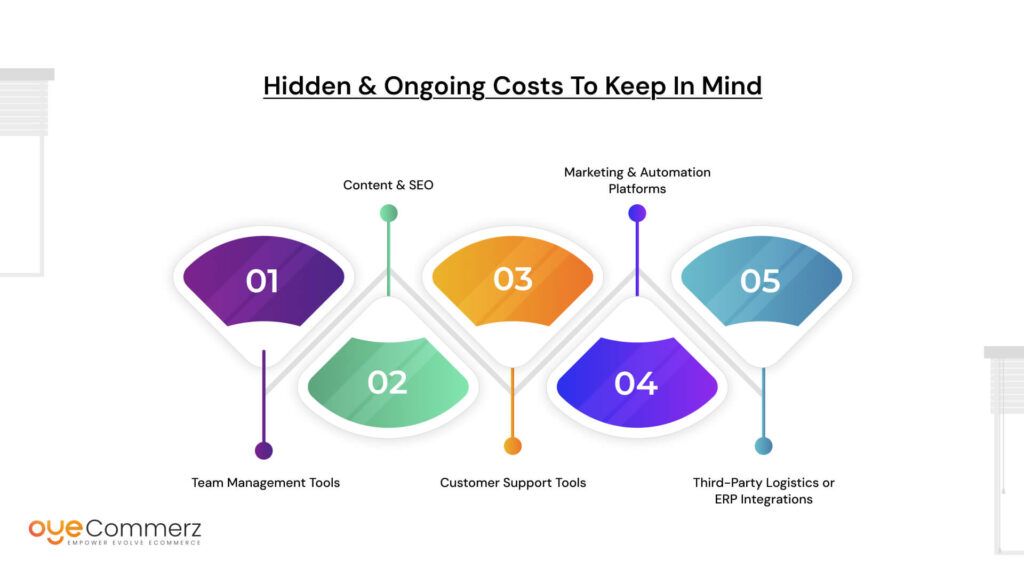
Even after setting up your Shopify store for B2B, some ongoing or less obvious expenses can creep in. If you want to calculate your Shopify B2B cost accurately, you need to think beyond just monthly subscriptions and apps.
1. Team Management Tools
As your B2B operations grow, so do your team’s needs. You may need external tools for team collaboration, support tickets, CRM integrations, or even internal training platforms. While Shopify does offer user permissions, larger teams often outgrow these native features quickly.
2. Content & SEO
B2B buyers don’t just visit your store—they research. A big part of your success lies in maintaining strong content, product pages, and search visibility. Hiring writers, SEO consultants, or using content tools (like SEMrush or Ahrefs) adds to your Shopify B2B cost—but also contributes significantly to long-term B2B development.
3. Customer Support Tools
B2B clients expect personalized support. Integrating live chat, chatbots, or customer service platforms like Gorgias or Zendesk may not be optional for long. These tools start around $50/month and scale up depending on your usage.
4. Marketing & Automation Platforms
To keep your B2B pipeline flowing, you’ll likely need email marketing platforms, automation tools (like Klaviyo or Mailchimp), or even retargeting ad spend. While Shopify supports email features, serious businesses often upgrade.
5. Third-Party Logistics or ERP Integrations
If you’re managing bulk orders, you may integrate shipping platforms, warehousing tools, or ERP systems. These tools enhance operational efficiency but come with both setup and monthly costs.
The true Shopify B2B cost is a combination of visible and invisible factors. Budget for growth don’t just plan for launch. The goal isn’t to keep costs low; it’s to keep ROI high.
Is Shopify the Right Fit for Your B2B Development Journey?
Now that we’ve broken down the numbers, features, and ongoing costs let’s get real. Is Shopify actually the right home for your B2B store?
The answer? It depends on your business model, growth goals, and how much control you want.
Why Shopify Might Be Right for You:
- You’re scaling fast. If your B2B business is growing and needs a platform that won’t hold you back, Shopify delivers.
- You want simplicity. You don’t need to be a developer to launch and manage your site.\
- You love flexibility. From wholesale pricing apps to third-party CRM tools, Shopify lets you choose how you want to build.
- You value user experience. Shopify shines when it comes to frontend design and mobile responsiveness—two things B2B buyers increasingly expect.
Why You Might Pause:
- High customization needs? If your B2B development requires deeply customized workflows or backend logic, you might need more developer support than usual.
- Tight margins? While Shopify’s pricing is fair, apps and added tools increase the total Shopify B2B cost, which can impact early-stage sellers.
- You’re in a super-niche industry. Some businesses need platforms with more specialized B2B modules built-in.
Shopify is not a perfect one-size-fits-all platform, but it is powerful, scalable, and extremely B2B-friendly when set up the right way.
What Other Businesses Are Spending
To truly understand Shopify B2B cost, it helps to peek into how other businesses are investing in their setup. While every store is unique, some clear patterns emerge.
Let’s say:
You’re a mid-sized distributor selling eco-friendly packaging materials to restaurants across the country. You’re using the Shopify plan at $105/month, and you need a few essential apps:
- Wholesale pricing app: $49/month
- Invoice & quote tool: $29/month
- Custom catalog display: $79/month
- Email marketing platform (like Klaviyo): $60/month
Add in the occasional developer support for $100/month, and your monthly Shopify B2B cost is around $420–$500. If you added ERP or shipping integrations, that number could climb further.
For a business doing $40K+ monthly revenue, this cost is manageable—and even profitable—if set up right.
Meanwhile, a small-scale manufacturer selling to local wholesalers might start with the Basic plan, use one or two apps, and skip custom development altogether. Their costs may stay under $150/month.
Your total cost depends on how much functionality you need today—and how much growth you’re building for tomorrow. B2B development isn’t about spending more, it’s about spending smarter. The better you understand your needs, the more efficiently you can budget.
Is the Investment Worth It?
Let’s not sugarcoat it, setting up a B2B store on Shopify takes time, thought, and money. But is it worth the investment?
Let’s say:
You’re a wholesaler of artisanal teas expanding from phone-based orders to digital. You spend around $3,000 in setup and $300/month ongoing. Within six months, your order volume doubles, reorders are automated, and your customer support load drops.
That’s not just a cost it’s a transformation.
Why It’s Worth It:
- You own the customer experience, from catalog to checkout.
- You gain back time with automation and streamlined processes.
- You become scalable, ready to handle 2X or 10X the volume without stress.
- You create a modern buyer experience, which 80% of B2B customers now expect.
Even if your Shopify B2B cost feels high initially, the long-term ROI often pays for itself through saved time, higher retention, and bigger order values. Plus, Shopify’s ease-of-use means fewer tech headaches and faster go-lives.
Think of your Shopify B2B store as more than a website, it’s your digital sales engine. Invest with intention. Build with purpose. And always keep your buyers at the center of the experience.
The real cost? Not building it right the first time.
Ready to Take Your B2B Store to the Next Level?
At OyeCommerz, we don’t just build Shopify stores, we craft complete B2B experiences. From setup to strategy, our team helps you simplify workflows, boost sales, and deliver the buying experience your customers deserve.
Let’s build something powerful together.
Contact us now!
Let's build your custom Shopify app today!
Conclusion
When it comes to scaling your wholesale or manufacturing business, understanding the real Shopify B2B cost is essential. It’s not just about the monthly fee—it’s about choosing the right apps, features, and B2B development that support your growth. Shopify gives you a flexible, modern platform that can evolve with your business needs.
From pricing tiers to private portals and quote systems, Shopify B2B isn’t just a feature—it’s a strategic edge. Yes, there are costs, but they’re investments in better workflows, happier buyers, and scalable success.
The takeaway? Plan wisely, customize thoughtfully, and make every dollar count. If done right, the payoff is smoother operations, stronger customer relationships, and consistent growth.
Looking to build a B2B experience that actually works for you? Now’s the time to start.
Frequently Asked Questions
Available with Shopify Plus, starting at $2,000/month, designed for wholesalers and bulk buyers.
Include the monthly plan ($39 to $399), transaction fees (0.5%–2%), and costs for third-party apps or themes.
Typically starts at $39/month but can go higher with added apps, payment fees, and store customizations.
Begins at around ₹1,994/month for the Basic plan, with additional charges for payment processing and apps
Customized for large-scale businesses using Shopify Plus; pricing depends on order volume and usage.
Ranges from ₹10,000 to ₹1,00,000+ per month, depending on platform and reach.

